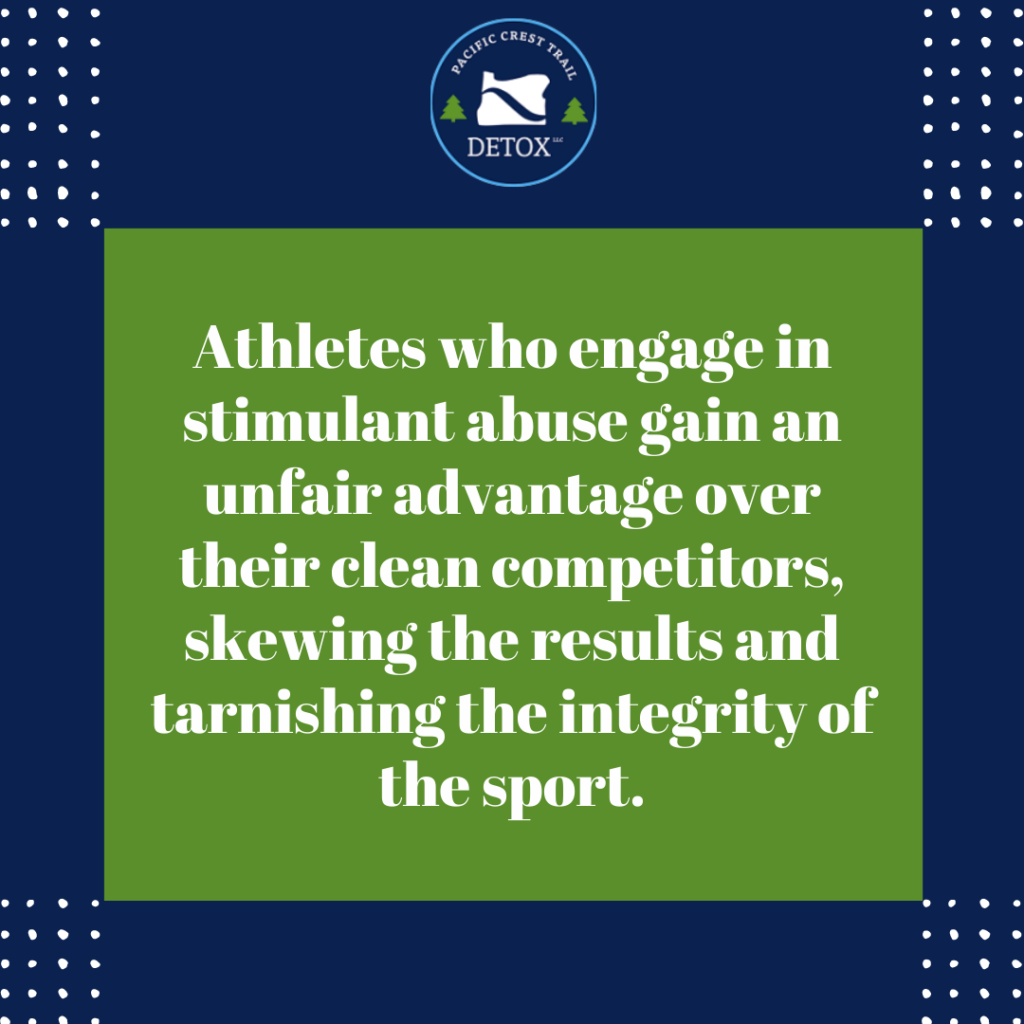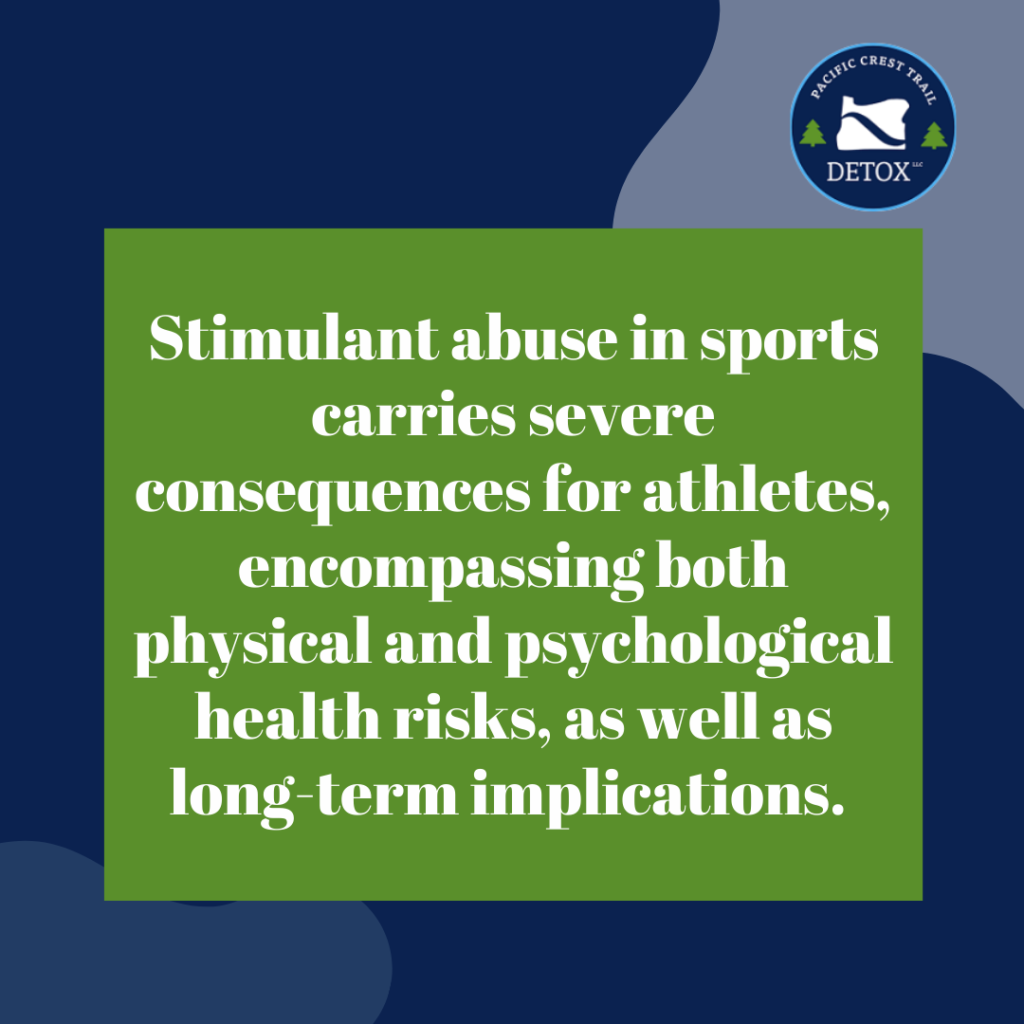In the realm of sports, the pursuit of excellence and victory often drives athletes to push their limits and strive for peak performance. However, the quest for glory sometimes leads to a darker side of competition: stimulants abuse and the use of performance-enhancing drugs.
This unethical practice, commonly known as doping, has far-reaching consequences that extend beyond individual athletes to impact the very essence of fair competition. Understanding the significance of stimulant abuse in sports and its association with doping is crucial for recognizing its detrimental effects and finding ways to maintain integrity within the sporting world.

What is Doping?
Doping encompasses the use of banned substances or methods to enhance athletic performance. It has become synonymous with the abuse of stimulants in sports. It involves the utilization of various performance-enhancing drugs, including anabolic steroids, blood doping agents, and growth hormones.
While stimulants may not be the only form of doping, their association with performance enhancement and the drive for immediate results make them a significant concern. The use of performance-enhancing drugs, including stimulants, has severe consequences for fair competition. It undermines the very essence of sportsmanship, eroding the principles of fair play, equal opportunity, and respect for rules.
Athletes who engage in stimulant abuse gain an unfair advantage over their clean competitors, skewing the results and tarnishing the integrity of the sport. Moreover, doping not only compromises the credibility of individual athletes but also erodes the trust and faith of fans, sponsors, and governing bodies in the sporting world.
Understanding Stimulant Abuse in Sports
Stimulant abuse in sports involves the misuse of stimulant substances to enhance performance. Commonly abused stimulants include amphetamines, cocaine, and methylphenidate.
Athletes may engage in doping practices, including stimulant abuse, for various reasons. These include the desire for performance enhancement, pressure to meet high expectations, financial incentives, concerns about self-image and reputation, the belief that stimulants aid in recovery and injury management, and a lack of awareness about the risks involved.
Addressing stimulant abuse requires a comprehensive approach. This includes enforcing anti-doping policies, raising awareness, providing support systems, and promoting fair play and integrity in sports.

Types of Performance-Enhancing Stimulant Drugs
Performance-enhancing stimulant drugs encompass a range of substances commonly abused in sports to enhance athletic performance. Among the frequently abused stimulants are amphetamines, such as Adderall and Dexedrine, which increase alertness and focus while reducing fatigue. Cocaine, a powerful stimulant, enhances energy levels, suppresses appetite, and boosts confidence. Methylphenidate, often prescribed for ADHD, improves attention and concentration.
These drugs enhance athletic performance by increasing alertness, prolonging endurance, reducing perceived effort, and enhancing motivation. This provides athletes with an unfair advantage by allowing them to train harder, compete longer, and recover quicker. However, the use of these substances comes with significant health risks and violates the principles of fair play and sportsmanship.
Consequences of Stimulant Abuse in Sports
Stimulant abuse in sports carries severe consequences for athletes, encompassing both physical and psychological health risks, as well as long-term implications. In terms of physical health, stimulant misuse can lead to cardiovascular complications, such as high blood pressure, irregular heart rhythms, and increased risk of heart attacks or strokes.
Additionally, athletes who abuse stimulants may experience dehydration, overheating, and increased risk of injuries due to impaired judgment and altered perception of pain. From a psychological standpoint, stimulant abuse can result in mood disorders, anxiety, irritability, aggression, and even addiction.
Furthermore, the long-term implications of stimulant misuse extend beyond the immediate risks. Athletes may suffer reputational damage, face bans from competition, and endure long-lasting health consequences that impact their overall quality of life.
It is crucial to prioritize the health and well-being of athletes, both in the present and for their future, by combating stimulant abuse and promoting clean and fair competition.
Ethical Considerations and Fair Competition
Engaging in stimulant abuse in sports violates the fundamental principles that govern fair play and equal opportunity. Athletes who resort to doping practices gain an unfair advantage over their clean competitors, distorting the level playing field and compromising the essence of genuine competition.
Fair competition is built on the principles of skill, talent, hard work, and dedication rather than artificial enhancements through stimulant abuse. Upholding ethical standards in sports ensures that athletes are judged based on their natural abilities, fostering an environment of trust, respect, and fairness.
Preserving fair competition promotes the ideals of sportsmanship and maintains the integrity of the sporting community as a whole, inspiring and captivating fans worldwide.

Anti-Doping Regulations and Testing
Anti-doping regulations and testing play a vital role in combating stimulant abuse and ensuring fair competition in sports. These regulations, established by organizations such as the World Anti-Doping Agency (WADA), set strict guidelines and prohibitions on the use of performance-enhancing substances, including stimulants.
Athletes are subject to regular and random testing to detect the presence of banned substances in their system. Anti-doping tests utilize sophisticated methods, including urine and blood samples, to detect the use of prohibited substances.
The implementation of robust anti-doping regulations and testing protocols serves as a deterrent and sends a clear message that stimulant abuse and doping will not be tolerated. It helps maintain the integrity of sports, protects the health and well-being of athletes, and ensures that fair competition remains at the forefront of athletic pursuits.
Support and Rehabilitation for Athletes
Rehabilitation programs for athletes are crucial in addressing stimulant abuse and promoting overall well-being.
Support systems may include access to mental health professionals, addiction specialists, and sports psychologists who can help athletes navigate their challenges. Portland detox centers offering rehabilitation programs can assist athletes in rebuilding their physical and psychological health.
By offering a compassionate and comprehensive approach, support and rehabilitation programs empower athletes to make positive changes, overcome challenges, and regain control of their lives. These programs contribute to athletes’ overall health and resilience, allowing them to thrive both in and outside of sports.

Stimulant abuse in sports and the associated doping problem pose significant challenges to the integrity of fair competition and the well-being of athletes. Understanding the motives behind doping and the types of performance-enhancing stimulant drugs commonly abused is crucial in addressing this issue effectively. The consequences of stimulant misuse extend beyond immediate health risks to include long-term implications for athletes.
However, by implementing anti-doping regulations, rigorous testing protocols, education and awareness campaigns, and support and rehabilitation programs, we can strive to maintain the principles of fair play and sportsmanship.
By prioritizing clean and fair competition, we can foster a culture of integrity within the sporting world and ensure that sports continue to inspire, captivate, and serve as a platform for human achievement.
If you know someone needing help from stimulant abuse, feel free to reach out to Pacific Crest Trail Detox. Call us today to schedule an appointment.
